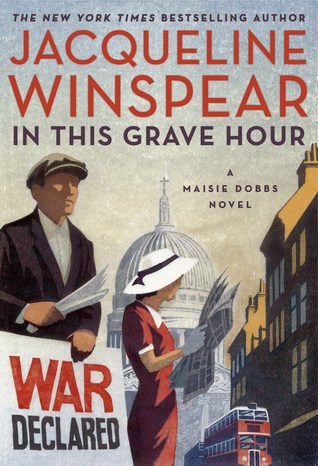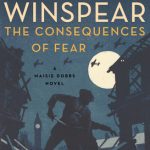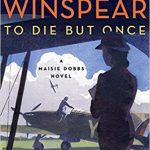 In This Grave Hour (Maisie Dobbs, #13) by Jacqueline Winspear
In This Grave Hour (Maisie Dobbs, #13) by Jacqueline Winspear Formats available: hardcover, large print, ebook, audiobook
Series: Maisie Dobbs #13
Pages: 352
Published by Harper on March 14th 2017
Purchasing Info: Author's Website, Publisher's Website, Amazon, Barnes & Noble, Kobo, Bookshop.org
Goodreads
As Britain becomes engulfed in a second World War, the indomitable Maisie Dobbs is plunged into a treacherous battle of her own when she stumbles on the deaths of refugees who may have been more than ordinary people seeking sanctuary on English soil, in this enthralling chapter in Jacqueline Winspear’s enormously popular New York Times bestselling series
Critics have long sung the praises of Jacqueline Winspear and her bestselling Maisie Dobbs series. In the thirteenth installment, Maisie—“one of the great fictional heroines, equal parts haunted and haunting.” (Parade)—is back with more mystery, adventure, and psychological insight.
When readers last saw Maisie Dobbs, it was 1938 and the world was on the brink of war. Maisie herself was on a dangerous mission inside Nazi Germany, where she encountered an old enemy and the Führer himself. In This Grave Hour, a year has passed and Maisie is back home in England—yet neither she nor her nation is safe. Britain has just declared war on Germany and is mobilizing for the devastating battle ahead. But when she stumbles on the deaths of a group of refugees, Maisie suspects the enemy may be closer than anyone knows.
Old fans will be delighted at Maisie’s return and new readers will be hooked by this thrilling installment in Jacqueline Winspear’s “thoughtful, probing series” (Oprah.com).
My Review:
Welcome to the Sitzkrieg, or as it was better known in Britain, the Phoney War.
As this 13th book in the Maisie Dobbs series opens in the fall of 1939, Britain declares war on Nazi Germany after its invasion of Poland. Then nothing happens. And nothing continues to happen for eight months, until Germany invades France and the Low Countries (Belgium, Luxembourg, the Netherlands) in May of 1940.
But during the period of this book, nothing much happens on the war front. Everyone knows it will come, and many people, including Maisie herself, have known that war was coming for quite some time, but for the moment, there is a pause. Not a peace by any stretch of the imagination. More like a vast inhaling of breath before the six year sigh of loss after loss.
And a murder. A whole series of murders. Deaths that owe their origin, not to the stresses of the upcoming war, but to the unresolved issues of what people are suddenly forced to call “the previous war” – the Great War, the War that unfortunately did not End All Wars, what history came to call World War I.
Murder, unfortunately for the world but fortunately for Maisie, never takes a vacation.
 As the story opens, Maisie is dragged away from the war announcement to meet an old colleague. Dr. Francesca Thomas, in her guise as a member of the Secret Service, prepared Maisie for her undercover task in Journey to Munich. Now Dr. Thomas wants to hire Maisie to investigate the murder of a Belgian refugee from the previous war who has been murdered on the eve of this one.
As the story opens, Maisie is dragged away from the war announcement to meet an old colleague. Dr. Francesca Thomas, in her guise as a member of the Secret Service, prepared Maisie for her undercover task in Journey to Munich. Now Dr. Thomas wants to hire Maisie to investigate the murder of a Belgian refugee from the previous war who has been murdered on the eve of this one.
Dr. Thomas is herself a Belgian national, and is now attached to that embassy. The murder of her fellow countryman is a crime that she wants to redress, before it happens again. She is aware of just how good Maisie is at her job, but she still keeps secrets. It is her nature. And almost her undoing.
While Maisie tracks down the patterns of life and causes of death of the late Frederick Addens, more former Belgian refugees turn up dead. By the same method, and most likely by the same hand. But whose? And more important to Maisie, why?
As Maisie begins to close the net around a suspect she also finds herself deep into a problem much closer to home.
Many children were evacuated from London to the countryside at the opening of the war. One such young girl is now boarded with Maisie’s family. But this little girl is a bit different. Not just because her coloring is noticeably darker than English peaches and cream, but because the little girl refuses to speak, and seems to have no documentation whatsoever.
And Maisie can no more resist solving that little puzzle than she can let a murderer go free. No matter the cost to herself.
Escape Rating B+: As World War II begins, this series reminds me more and more of Foyle’s War. (That there are no books for Foyle’s War continues to be a great source of disappointment!) Like Christopher Foyle, Maisie solves her cases with her brains rather than her fists. Also like Foyle, she is solving murders on the homefront, a task that many people think of as less important than the war. But as it so often turns out, those murders are often not divorced from the war, and in some cases are hidden by it until the investigator steps in.
As much as I love this series, this particular entry didn’t grab me by the throat and hang on quite the way that some of the other books have. I still enjoyed it, but it has the feeling of a pause before the storm, much as Britain itself was in during the Phoney War. Pauses, by their nature, just aren’t as dramatic as crises. And so it proves with this book.
There are, as there often are, two mysteries in front of Maisie. They don’t dovetail as well as they sometimes do. The murder of Frederick Addens, and the ones that follow, are one case, and while important, it feels like merely a case. The little girl’s missing identity is the part of the story that strikes Maisie’s heart, and it is the one that felt most important, even if the string of murders was obviously deadlier and had larger implications, or should have.
And that’s part of what fell just a bit flat for me. The serial murders of Belgian refugees and the people who assisted them felt like it was building up to something bigger. The resolution actually turned out to be small and rather close to home. Also frustrating as regards that particular case, both for Maisie and the reader, is just how much and how obvious it was that Dr. Thomas was, if not telling actual lies, certainly lying by omission every time she spoke. And yet she never seriously emerges as a possible candidate to be the murderer.
On that other hand, the case of the little girl was heartbreaking, particularly for Maisie. She sees herself in the child, as well as the child she lost when her husband was killed. Her heart is engaged with someone who will eventually have to go home. Perhaps. That piece of the story has yet to be resolved.
And I’m very much looking forward to Maisie’s further adventures, to discover just how she resolves it. Or doesn’t. I expect to find out next year during the 2018 Month of Maisie Readalong!























I’m very behind on the Maisie series but I am looking forward to getting caught up – the pre WWII era is fascinating to me!
Thanks for being a part of the tour.